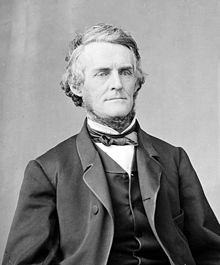William Dennison (Ohio governor)
| William Dennison, Jr. | |
|---|---|
 |
|
| 24th Governor of Ohio | |
|
In office January 9, 1860 – January 13, 1862 |
|
| Lieutenant | Robert C. Kirk |
| Preceded by | Salmon P. Chase |
| Succeeded by | David Tod |
| 21st United States Postmaster General | |
|
In office September 24, 1864 – July 25, 1866 |
|
| President |
Abraham Lincoln Andrew Johnson |
| Preceded by | Montgomery Blair |
| Succeeded by | Alexander Randall |
| Member of the Ohio Senate | |
| Personal details | |
| Born |
November 23, 1815 Cincinnati, Ohio |
| Died | June 15, 1882 (aged 66) Columbus, Ohio |
| Resting place | Green Lawn Cemetery Columbus, Ohio |
| Political party |
Whig Republican |
| Spouse(s) | Anne Neil Dennison |
| Alma mater | Miami University |
| Profession | Lawyer |
| Signature | |
William Dennison, Jr. (November 23, 1815 – June 15, 1882) was a Whig and Republican politician from Ohio. He served as the 24th Governor of Ohio and as U.S. Postmaster General in the Cabinet of President Abraham Lincoln during the American Civil War.
Born in Cincinnati, Dennison graduated from Miami University, studied law, and was admitted to the Ohio bar in 1840. A canny businessman, he led the Exchange Bank and the Columbus and Xenia Railroad, and organized the Columbus and Hocking Valley Railroad, while becoming active in politics.
In 1840, he married Anne Eliza Neil, the daughter of the wealthy Columbus businessman William Neil, whose farm later became the campus of Ohio State University. Together, William and Anne Dennison had seven children. The eldest of them was a son, William Neil Dennison, who later won distinction in the Civil War while serving in the U.S. Horse Artillery Brigade.
William Dennison, Jr., was one of the first major Ohio politicians to leave the dying Whig Party for the new Republican Party. He rose quickly through the party ranks due to his anti-slavery and anti-discrimination efforts in the Ohio State Senate. Dennison was elected to the governorship in 1859, defeating Rufus P. Ranney, and served a single term from 1860 to 1862. Before the outbreak of the American Civil War, he refused the demands of Kentucky and Virginia state authorities for the extradition of fugitive slaves or the punishment of those who helped them.
...
Wikipedia
